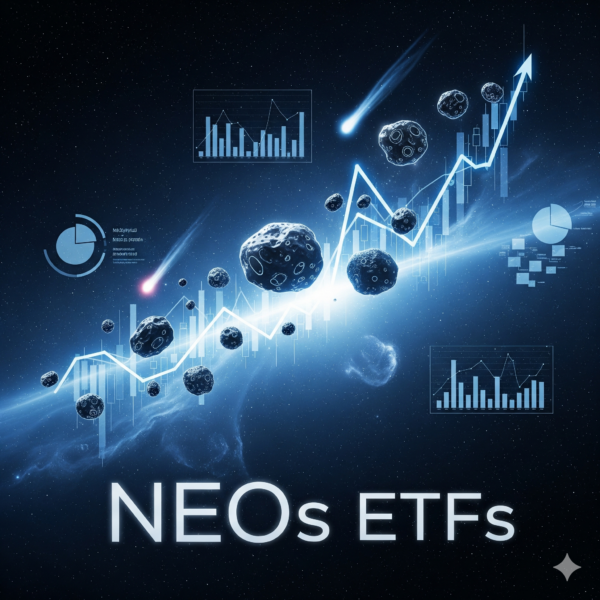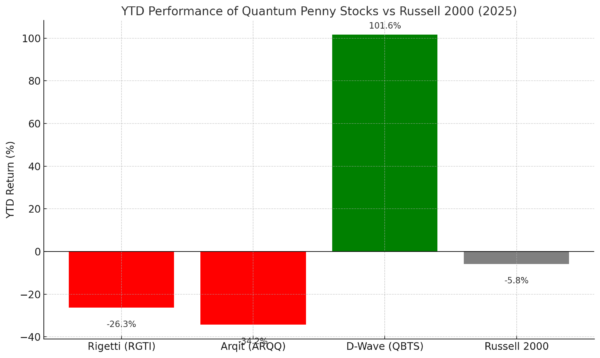Three Space ETFs to Invest in That Are Outperforming Ark’s ARKX
The final frontier is capturing more than just the imagination of investors. Some are even making money from it. But not all space ETFs are seeing a return on investment dollars. In fact, the Ark Invest Space Exploration ETF is actually down since its inception at the end of March of 2021.
Nonetheless, the mere news of Ark filing its prospectus to launch a space ETF (under the ticker ARKX) did bolster up some individual stocks at the time. Virgin Galactic (NYSE: SPCE) saw a healthy bump in share price from the announcement. So did Maxar Technologies (NYSE: MAXR). However, neither of these are holdings of the Ark ETF.

That being said, the excitement around this new ETF was warranted. The Ark Innovation ETF (NYSE: ARKK) became the largest actively managed ETF in 2020. And it saw returns of more than 150% in 2020. That being said, the fund is down nearly 50% year-over-year.
However, in the process, Ark Investment Management CEO Cathie Wood developed a cadre of dedicated fans. This is at least in part due to her focus on disruptive companies. Somewhat notorious for her bullish stance on Tesla (Nasdaq: TSLA), the iconoclastic CEO has set a $7,000 price target for the electric car company by 2024. And Tesla’s success played no small role in the success of ARKK. Tesla remains the fund’s largest holding.
And by most accounts, she has maintained this view when it comes to Ark’s space ETF. According to the filing, the ETF’s holdings are…
leading, enabling or benefitting from technologically enabled products and/or services that occur beyond the surface of the Earth.
But there is at least one notable company missing from the fund besides Virgin Galactic and Maxar Technologies…
More Than Musk
At this point, the only thing we can be certain of is that the list of actively managed holdings won’t be including Elon Musk’s other company, SpaceX. At least not until SpaceX goes public. And that doesn’t seem likely anytime soon. But it is growing increasingly likely that Musk will spin his internet satellite company (Starlink) off of SpaceX and possibly go public with that…
But speculating about the potential holdings of an ETF aren’t really all that useful. Especially when we have the benefit of hindsight to look at.
So, while we wait to see the how ARKX looks to keep up in the space ETF race, here are three straightforward space ETFs to gain some exposure to the burgeoning industry.
Three Space ETFs Outperforming ARK Space Exploration & Innovation ETF
- IShares U.S. Aerospace & Defense ETF (Ticker: ITA)
- Procure Space ETF (Nasdaq: UFO)
- SPDR Kensho Final Frontiers ETF (NYSE: ROKT)
IShares U.S. Aerospace & Defense ETF
There’s a lot going on in the skies above Earth. Nearly 6,000 satellites are believed to be teeming in the skies above. And that number is continuing to rise. But it’s not just expensive communication satellites that are driving the rapid growth of the space economy. Another force to be reckoned with are the companies benefitting from military contracts.
This is where the iShares U.S. Aerospace & Defense ETF comes into play. This ETF tracks an index of U.S. manufacturers, assemblers and distributors of air defense equipment. In fact, Boeing (NYSE: BA) makes up nearly 20% of its weighing.
This could be useful to know for investors because Boeing is responsible for the X-37 Orbital Test Vehicle, which is the hallmark of reusable space technologies to date. Boeing is also in the midst of designing a launch system for carrying people and cargo into deep space.
The other major holding of this ETF is Raytheon Technologies (NYSE: RTX). This is worth mentioning to space enthusiasts because the company has been awarded a contract to test the use of commercial space internet services on military aircraft. Raytheon has also been awarded massive contracts from Space Force to develop and produce anti-jam satellites. These are two major factors that make this a promising space ETF.
Procure Space ETF
This ETF with the unforgettable ticker of UFO uses a rules-based methodology to identify companies in space-based functions. In the process, investors in this will gain exposure to companies like Garmin (Nasdaq: GRMN) and ORBCOMM (Nasdaq: ORBC), which are really more space-adjacent.
That can be good news for those looking for a diversified investment. But for those looking for a pure space play, perhaps a little less so. But there are other major holdings of this ETF to balance it out. Its two largest comprise Maxar Technologies (NYSE: MAXR) and Iridium Communications (Nasdaq: IRDM).
Maxar provides earth intelligence and space infrastructure products. And among other things, Iridium provides satellite-based mobile communications and data devices for the military and intelligence community. And on top of those, Virgin Galactic Holdings (NYSE: SPCE) makes up just under 5% of its weighing… which to date is one of the purest space plays out there. All of these factors put together make UFO one of the most attractive space ETFs currently available.
SPDR Kensho Final Frontiers ETF
It doesn’t require a trek to the stars to profit from space. And while the crew aboard the USS Enterprise traveled alone, one of the best ways is to invest in space is through a multifaceted approach… one involving many teams, companies and different pieces of technology.
The lion’s share of this ETF’s holdings is concentrated on aerospace and defense. This ETF grants affordable exposure to the likes of CACI (NYSE: CACI), which is developing laser communications transmitters for use in deep space exploration. It’s also a cheap way to get hold of Teledyne Technologies’ stock (NYSE: TDY). This outfit just entered the uncooled infrared market with its acquisition of Flir. This strengthens Teledyne’s already robust lineup of imaging systems used in aerospace and defense.
This is also a cheap way to gain access to big-name players like Lockheed Martin (NYSE: LMT) and Honeywell International (NYSE: HON), both of which are providing integral aspects to space travel and safety. This makes the ROKT ETF, a strong space ETF to invest in while keeping your feet on the ground.
The Bottom Line on Space ETFs
The space industry is generating roughly $350 billion in revenue. But that is expected to skyrocket above $1 trillion annually in the coming decades. And when that happens, those who get in early in the right companies can expect to see outsized returns.
But instead of guessing who the big players are going to be five, 10 or 20 years down the road, it’s a lot easier to gain exposure to this prospering industry through a diversified space ETF. It’s the easiest way to play this growing trend. And don’t count the ARKX ETF out for too long. Cathie Wood’s ARK Invest has a knack for surprising investors… in a good way.
About Matthew Makowski
Matthew Makowski is a senior research analyst and writer at Investment U. He has been studying and writing about the markets for 20 years. Equally comfortable identifying value stocks as he is discounts in the crypto markets, Matthew began mining Bitcoin in 2011 and has since honed his focus on the cryptocurrency markets as a whole. He is a graduate of Rutgers University and lives in Colorado with his dogs Dorito and Pretzel.





